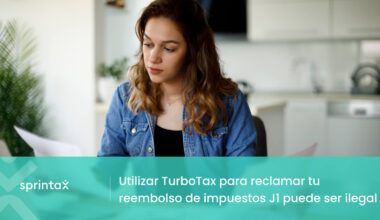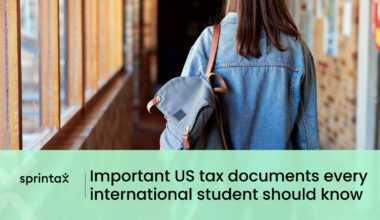(Last updated: 6 Mar 2025)
It’s tricky being self-employed – after all, you need to keep a close eye on your income and all of your deductible expenses!
It’s even more tricky being self-employed in a country where you are unfamiliar with the local tax rules.
What’s more, when you are considered a nonresident for tax, special rules apply to you when compared with a resident.
In this blog we will cover the key information that nonresident self-employed individuals in the US need to know about their tax filing obligations.
What we cover:
- Who is self-employed?
- Self-employment tax
- Estimated tax
- Tax deadline
- Calculating self-employment tax
- Freelancers
- F-1 students on OPT
- Tax deductions
- Information returns
- Federal & State tax return
Who is considered a self-employed individual in the US?
The IRS (Internal Revenue Service) defines a self-employed worker as “someone who carries on a trade or business as a sole proprietor or independent contractor, A member of a partnership that carries on a trade or business, or Someone who is otherwise in business for themselves, including part-time business”.
Essentially, you are considered to be self-employed if you derive income by conducting profitable operations of a certain business, instead of receiving payroll salary as an employee.
As someone on an F-1 or J-1 visa, you will more than likely be considered a nonresident. There are exceptions to this, of course, for example if you pass the Substantial Presence Test.
You can find out more about your residency status here.

What is self-employment tax and how is it different from payroll income tax?
There are a few differences between tax for self-employed individuals and the system applied to those that are considered employees.
The main difference between these two types of tax is that self-employment tax will be paid by the self-employed individual, whereas income taxes are paid by employees as well as their employers.
How is self-employed income taxed for a nonresident?
The self-employment tax rate for the 2024-25 tax season is 15.3%.
This tax rate is made up of two parts: 12.4% for Social Security as well as 2.9% for Medicare.
While most nonresident payroll employees will not be taxed on Social Security and Medicare, this is different for self-employed workers.
The Social Security wage cap is set at $168,600 for 2024 tax year and $176,100 in 2025. Essentially, this means you won’t pay any Social Security tax after the first $176,100 of your income.
You’ll have to pay income tax as well as self-employed tax if your business has a net profit of over $400.
Do nonresidents have to pay self-employment tax?
Many people will wonder who has to pay nonresident alien self-employment in the US.
Well, the IRS will view you as self-employed if you are a freelancer, independent contractor, or you own your own business.
You are defined as self-employed if:
- You are a sole proprietor or an independent contractor of a business.
- You are part of a partnership that carries on a trade or business.
- You are in business for yourself only (this includes a part-time business or a gig worker).
An example of a sole proprietor is an artist, freelance writer, or IT consultant.
You will need to pay this tax only if your net earnings from being self-employed were $400 or more.
Estimated tax
The method used to pay Social Security and Medicare taxes and income tax is known as Estimated Tax, and Form 1040-ES, Estimated Tax for Individuals is used to figure out these taxes.
This form will contain a worksheet that is quite similar to Form 1040NR. You’ll need your tax return from the year before to be able to fill out Form 1040-ES.
The worksheet in Form 1040-ES, Estimated Tax for Individuals will help you figure out if you are required to pay quarterly estimated tax payments.

When is the tax deadline for nonresident self-employed individuals?
The deadline for filing your tax return is generally around 15 April each year.
It is important to file your tax return on time. Failing to do so may lead to fines and penalties on top of any money you owe as well as potential Green Card and visa problems in the future.
How do I calculate my self-employment tax?
In order to calculate the amount of self-employment tax that you will pay, you should start by finding your net earnings from self-employment. Remember, if these are less than $400, you won’t be taxed.
Net earnings are calculated simply by subtracting business expenses from your business income. To do this, you should file a Schedule C as part of IRS Form 1040NR, your nonresident tax return.
Sprintax can help you calculate how much tax you’ll pay!
By calculating how much self-employed tax you’ll pay, you will not be in for a shock come tax season!
Are nonresident freelancers taxed the same as self-employed nonresidents?
Yes, freelancers will be taxed at a rate of 15.3%, the same as self-employed nonresidents.
This also represents the 12.4% Social Security and 2.9% Medicare tax rates.
Can F-1 students on OPT be self-employed?
F-1 OPT self-employment can be a tricky area for nonresidents to navigate.
Essentially, yes, F-1 OPT students can be self-employed.
However, the role they undertake must be specifically related to their field of study.
What kind of expenses can a nonresident self-employed worker claim?
There are plenty of self-employed tax deductions available to nonresidents in the US.
General business expenses
Did you make business purchases on your credit card? If so, you may be able to deduct credit card interest on your federal tax return!
That is because the IRS considers any qualified business purchases as being “ordinary and necessary” for the running of said business.
Included in this can be your phone and internet bills, meals, salaries and wages.
IMPORTANT: In order to be self-employed you will need off campus work authorization from your school’s international office.
Self-employment without your international office’s authorization can be a violation of your visa status – therefore it is vital to talk to your school’s offices before undertaking any self-employed work.
Expenses on education and training
These will need to be in line with education that maintains or improves your skills in your current field.
For example, if you are paying for coding/networking classes in computer science or social media training in marketing, this will be deductible as it improves or maintains these skills.
Potentially eligible things include tuition, books and supplies, fees paid, and transportation – among others.
Mileage for business
Use your car for work? You could deduct your mileage on your yearly tax return!
It should be noted that personal trips cannot be claimed for this.
You’ll need receipts as evidence of your trips too.
Also, in order to be eligible to claim the standard mileage rate of 56 cents per mile, you’ll need to meet the following criteria:
- You need to own or lease the car you are claiming for
- You cannot operate more than five cars
- No depreciation can be claimed on any of the cars

Information returns
You may be required to file an information return with the IRS – this is what third-parties such as universities use to notify how much someone was paid during a tax year.
You’ll do this by completing a 1099-MISC or a 1099-NEC if you made payments of over $600.
You can find a guide to reporting information returns on the IRS website.
Filing a tax return
It’s true, you can always file your tax return by yourself.
This can be tricky for nonresidents though, as many are not used to the tax forms in the US.
Filing with your nonresident alien tax return with Sprintax Returns is the easiest way to complete your tax affairs!
Sprintax Returns can help you in preparing both Federal and State tax returns. This will ensure you are on the right side of the tax authorities and will receive your maximum legal US tax refund!
Remember, by not filing your tax return properly, you’re putting yourself at risk of being penalized by the IRS.
These penalties can range from cash fines to future Green Card/visa problems.
How will Sprintax Returns help me?
We will ensure you are 100% compliant with your tax obligations.
What’s more, if you did receive income in the US without having an ITIN or SSN, we can assist you in obtaining an ITIN and file your federal tax return!
We offer a 24/7 Live Chat service and our team is happy to assist you with your tax questions at any time.
With Sprintax Returns you will:
- Save time
- Easily find out your residency status
- Prepare a fully compliant US tax return
- Avail of our 24/7 Vita Qualified Live Chat facility
Prepare your US nonresident tax return with Sprintax Returns!








